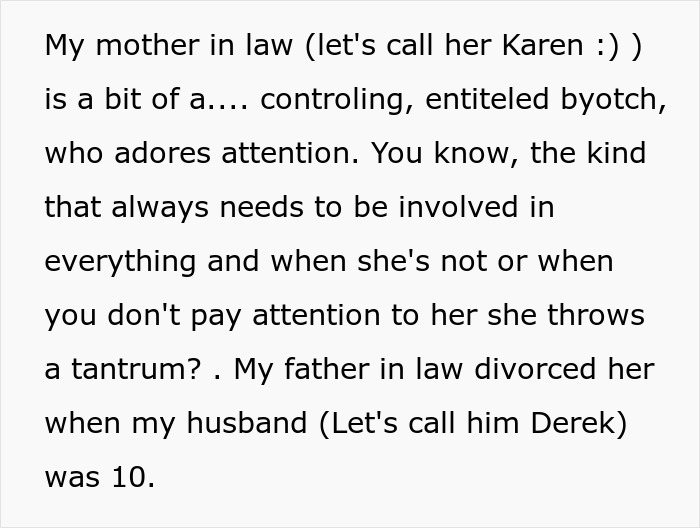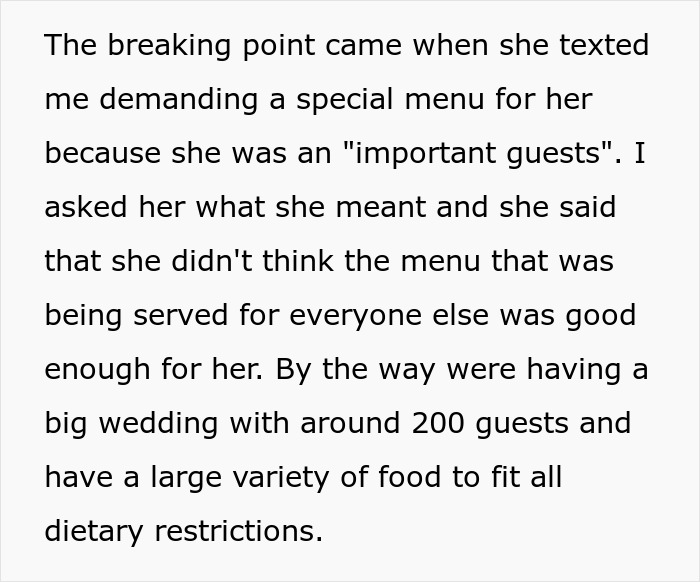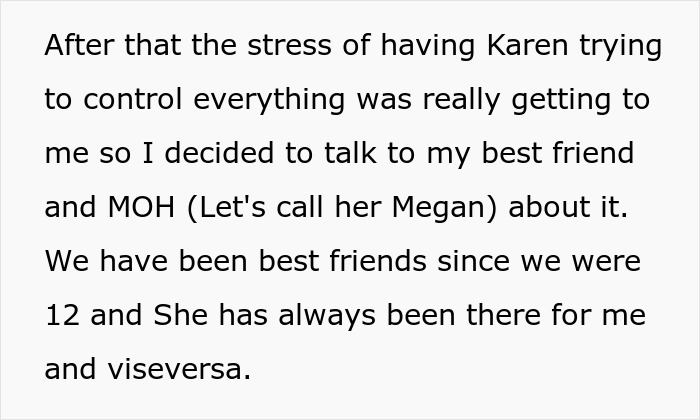Bride Gets Savage Revenge On Controlling MIL By Serving Her A ‘Special’ Meal At The Wedding
law drama can sometimes feel like it’s a cliché trope used by sitcom writers to add a little conflict. After all, what sort of unabashedly entitled person would take their kid’s wedding and think “this should all be about me”? Well, get seated, as it turns out, some people are really like this.
A woman shared her hilarious tale of revenge on her controlling and attention-seeking mother-in-law. The MIL in question kept making demands for a “special meal” at the dinner, so her maid of honor hatched a scheme to give her just that. We reached out to the bride who posted the story via private message and will update the article when she gets back to us.
RELATED:
- –“I Didn’t Even Have Time To React”: Bridesmaids Save Bride From Attention-Stealing MIL
- –“AITA For Telling My Friend That Her ‘Free’ Wedding Is Unrealistic?”
- –Woman Refuses To Attend The Wedding After Bride’s Unhinged Decision, Is Expected To Fulfill Bridesmaid Duties
A MIL making wedding demands is a headache

Image credits: teksomolika (not the actual photo)
So one woman’s maid of honor hatched a plan to prank the mother of the groom





Image credits: freepik (not the actual photo)





Image credits: Meghan Hessler (not the actual photo)




Image credits: cookie_studio (not the actual photo)

Image credits: Jolly_Passenger_8705
Anxiety of a “role change” sometimes make people act up
The phenomenon of the controlling mother-in-law has been a cultural punchline for so long that it’s easy to forget there’s actual psychology behind why some women transform into boundary-stomping wedding planners the moment their adult children get engaged. Understanding the roots of this behavior doesn’t excuse serving someone a Happy Meal at a formal wedding, but it does explain why that Happy Meal might have been richly deserved. Research in family psychology reveals that mothers-in-law who exhibit controlling and toxic behaviors often struggle with what experts call “role transition anxiety.” When a son or daughter gets married, the parent must navigate a fundamental shift in their relationship with their child.ADVERTISEMENT
For mothers who built their identity heavily around parenting or who maintained enmeshed relationships with their children, this transition can trigger intense feelings of loss and displacement. Rather than processing these feelings in healthy ways like perhaps talking to a therapist or taking up pottery, some mothers respond by attempting to reassert control over any situation involving their adult child. This might manifest as demanding to approve wedding dresses, critiquing color schemes nobody asked their opinion about, or insisting on special meal accommodations at a 200-person wedding like they’re visiting royalty.
The psychology gets even more interesting when you consider attachment theory. Studies published in the Journal of Family Psychology indicate that parents with anxious attachment styles often have difficulty respecting boundaries and may view their child’s partner as a threat rather than an addition to the family. When a mother wasn’t particularly close to her child growing up, as in the case of someone who suddenly becomes tearfully invested in “finally being part of Derek’s life” after an engagement announcement, it can signal an attempt to rewrite history or claim a role she never actually occupied. The wedding becomes less about celebrating the couple and more about the mother-in-law’s fantasy of the relationship she wishes she’d had.
Sometimes it’s not even anxiety but blatant narcissism
Entitlement and attention-seeking behaviors, particularly the kind that result in actual tantrums when needs aren’t met, often stem from narcissistic personality traits. Research from the American Psychological Association shows that individuals with these traits require constant validation and struggle when they’re not the center of attention. A wedding, which definitionally centers the couple getting married, becomes intolerable for someone whose psychological framework demands that all events orbit around them. Suddenly every detail becomes an opportunity to insert themselves into the narrative, from matching the bride’s dress to requiring cuisine befitting an “important guest” as though the mother of the groom is somehow more important than the other people attending.
The phenomenon intensifies when dealing with divorced parents who may have unresolved emotional issues stemming from their failed marriage. Clinical psychologist Dr. Terri Apter, who has extensively studied in-law relationships, notes that some mothers project their own unfulfilled dreams and regrets onto their children’s milestones. A mother who had a difficult marriage might unconsciously try to orchestrate her son’s wedding as the formal, perfect event she never experienced, completely disregarding that this wedding belongs to two other people who apparently prefer whimsical fairy princess vibes over her formal preferences.
What makes these situations particularly challenging is that traditional social pressure often demands that couples tolerate inappropriate behavior from parents in the name of “keeping the peace” or “respecting elders.” This creates a dynamic where boundary violations escalate because they’re repeatedly rewarded with compliance. When someone spends months commenting on every wedding detail like an uninvited co-planner and faces no consequences, they logically conclude that even more outrageous demands, say a custom menu, will also be accommodated. Breaking this cycle requires what family therapists call “firm but loving boundaries,” though occasionally it requires a Happy Meal with apple slices and a side of public embarrassment.
The most effective approach to handling controlling in-laws involves the adult child taking primary responsibility for managing their own parent. When a husband allows his mother to harass his fiancée about dress photos and color schemes for months without intervention, he’s essentially abandoning his partner to fight his battles. Research consistently shows that when the adult child sets and enforces boundaries with their parents, in-law relationships improve dramatically, or at least reach a tolerable level of dysfunction.